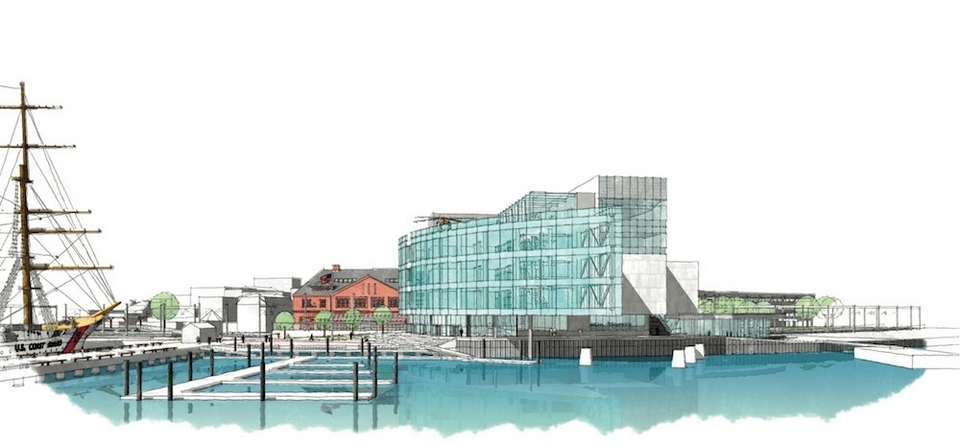Senate Committee Passes Bill Including $5 Million For Coast Guard Museum
By Julia Bergman
The Day
May 26, 2016

Architectural Rendering of the National Coast Guard Museum on the New London waterfront.
(Photo courtesy of National Coast Guard Museum Association)
U.S. Sen. Chris Murphy, D-Conn., announced Thursday that the Senate Appropriations Committee, of which he is a member, passed an appropriations bill for the Department of Homeland Security that includes $5 million for the National Coast Guard Museum.
The committee unanimously passed the $48.07 billion Department of Homeland Security Appropriations Act, which next will be taken up by the full Senate.
The $5 million would represent the first federal investment in the estimated $100 million museum project if the bill passes with the funding intact. Murphy said he was confident, given the funding “attracted zero attention” from the committee, that it will not be an issue on the Senate floor. He had previously said that he would have to “protect that number” when the bill reached the full Senate.
The House is crafting its version of the bill, and Murphy said his focus now is ensuring the $5 million gets into the House bill as well.
If the money is included in the House bill, it likely won’t be an issue at the conference committee, when House and Senate lawmakers work out any differences between their two bills. Murphy said during the negotiations, lawmakers set aside any similarities.
The National Coast Guard Museum Association, which is raising funds for the museum, is hoping for $30 million in federal support.
Murphy recounted what he told members of the association and others at a museum event in Washington on Wednesday.
“The attention really now will turn to the private fundraising effort,” he said. “It will get harder to convince my colleagues to appropriate the next chunk of money if private fundraising isn’t moving at a similar pace.”
Murphy’s ultimate goal is to get the full $30 million appropriated over the next several years, and at some point would like to move beyond $5 million.
“Five million (dollars) over six years isn’t fast enough,” he said.
The association has secured $15 million in private donations and pledges, and has a $20 million commitment from the state for a pedestrian bridge to provide access to the museum, which will be located on the waterfront adjacent to Union Station.
No major fundraising announcements have been made since late January when the association announced $4 million in pledges.
“Today’s investment is a down payment to get the artifacts and exhibits restored and ready to be displayed, but it’s also important seed money for New London and the Coast Guard as we all work together to make the museum a reality,” Murphy said in a statement.
Murphy, Sen. Richard Blumenthal, D-Conn., and Rep. Joe Courtney, D-2nd District, worked earlier this year to pass the Coast Guard Authorization Act, which changed language that prevented the Coast Guard from providing any funds for the museum.
The change does not allow for Coast Guard money to go toward the bricks-and-mortar aspects of the museum, so the $5 million would go toward interior work, such as “initial appraising, cataloguing and organizing the existing collection of artifacts,” according to a release from Murphy’s office.
“Specifically, it will support refurbishing artifacts currently owned by U.S. Coast Guard, such as Fresnel lenses, uniforms, textiles, boats, and other equipment and will help halt deterioration and prepare them for display,” the release says.
The bill also includes a provision that Murphy introduced that would prohibit the relocation of the Coast Guard Band from New London.
In September 2015, the Coast Guard confirmed that its vice commandant, Vice Adm. Charles D. Michel, had set up a working group to begin gathering research into “the costs and logistics of a potential relocation” of the band to the Washington, D.C., area. The 55-member band has called New London home for more than 90 years.
Since the bill is a one-year appropriations bill, the provision would have to be reauthorized next year.
As Murphy put it recently, it’s tougher to get provisions out than it is to reauthorize them.

